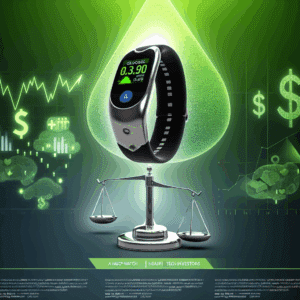The FDA’s recent green light for Signos’ groundbreaking glucose monitoring system marks a seismic shift in weight management—one that savvy investors and advisors should watch closely. Unlike traditional weight loss treatments that are tethered to obesity thresholds or sky-high costs, Signos opens the door to personalized, data-driven weight management for virtually anyone looking to shed pounds or maintain a healthier lifestyle.
Here’s why this matters—and why it’s a potential game-changer in the health-tech and wellness sectors.
Breaking Barriers in Weight Loss Accessibility
Current weight loss solutions, such as GLP-1 drugs like Novo Nordisk’s Wegovy or Eli Lilly’s Zepbound, are often restricted to patients with specific BMI criteria. Even when eligible, many face hurdles like limited insurance coverage, supply shortages, and prohibitive costs—GLP-1 therapies can run upwards of $1,000 per month. Surgical options, while effective, come with their own risks and accessibility issues.
Signos sidesteps these barriers by offering a membership-based model that leverages continuous glucose monitors (CGMs) from Dexcom paired with an AI-driven app. For a fraction of the cost—$129 to $139 for a multi-month plan—users receive real-time insights into how their bodies respond to food and exercise. This personalized feedback loop empowers behavioral changes that can lead to sustainable weight loss and metabolic health improvements.
The Bigger Picture: Tackling America’s Weight Crisis
With nearly 74% of Americans overweight or obese and obesity-related healthcare costs surpassing $170 billion annually (CDC data), the market demand for scalable, affordable weight management tools is immense. Signos’ technology has the potential to chip away at this epidemic by democratizing access to metabolic health insights.
Interestingly, Signos doesn’t position itself as a competitor to GLP-1s or bariatric surgery but rather as a complementary tool. Patients can use the system alongside these treatments or as a maintenance strategy post-weight loss. This integrative approach could broaden its appeal and adoption, particularly as insurers and employers express growing interest in covering such digital health solutions.
What Investors and Advisors Should Watch
-
Insurance Coverage Evolution: While insurers don’t currently cover Signos for weight management, the company is actively pursuing partnerships. If coverage expands, it could dramatically increase user adoption and revenue streams. Investors should monitor policy shifts and payer agreements closely.
-
Scaling and Data Advantage: Signos has already scaled its CGM inventory and AI capabilities to support tens of thousands of users. The accumulation of metabolic data at scale provides a competitive moat—enhancing the AI’s precision and opening doors for future product innovations or licensing opportunities.
-
Behavioral Health Integration: The system’s focus on actionable lifestyle changes aligns with the broader trend of personalized, preventive healthcare. Investors should consider how Signos might integrate with other health platforms or expand into related markets like diabetes prevention or cardiovascular health.
A Unique Insight: The Power of Real-Time Metabolic Feedback
Recent studies, such as one published in Cell (2023), highlight that individuals’ glycemic responses to the same foods can vary dramatically. This variability underscores the limitation of one-size-fits-all diets and the growing importance of personalized nutrition. Signos’ real-time glucose monitoring taps directly into this trend, offering a tailored approach that could outperform generic diet plans.
Actionable Advice for Investors and Advisors
- For Investors: Consider Signos and similar digital health companies as key players in the future of weight management and metabolic health. Watch for partnerships with payers and employers, which could be inflection points for growth.
- For Financial Advisors: Educate clients on the evolving landscape of weight loss technology. Those investing in biotech or health-tech funds should be aware of how digital health innovations like Signos complement pharmaceutical and surgical options.
- For Health and Wellness Investors: Explore opportunities to integrate CGM-based feedback into broader wellness programs, potentially partnering with Signos or developing complementary services.
What’s Next?
The FDA approval is just the beginning. As Signos scales and insurers potentially come onboard, expect a wave of innovation in personalized weight management. The company’s AI-driven platform could soon expand beyond weight loss to address chronic metabolic conditions, offering investors a front-row seat to the future of health tech.
In summary, Signos isn’t just offering a new weight loss tool—it’s pioneering a shift toward accessible, personalized metabolic health management. For investors and advisors, this is a compelling signal to recalibrate strategies and capitalize on the convergence of AI, digital health, and wellness.
Sources:
- Centers for Disease Control and Prevention (CDC)
- Cell Journal, 2023 study on personalized glycemic responses
- CNBC coverage on Signos and GLP-1 drug market dynamics
Source: FDA approves Signos glucose monitoring for weight loss

